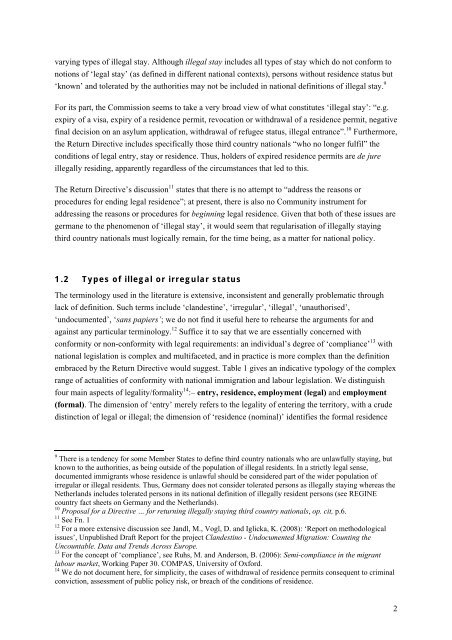REGINE Regularisations in Europe Final Report - European ...
REGINE Regularisations in Europe Final Report - European ...
REGINE Regularisations in Europe Final Report - European ...
Create successful ePaper yourself
Turn your PDF publications into a flip-book with our unique Google optimized e-Paper software.
vary<strong>in</strong>g types of illegal stay. Although illegal stay <strong>in</strong>cludes all types of stay which do not conform to<br />
notions of ‘legal stay’ (as def<strong>in</strong>ed <strong>in</strong> different national contexts), persons without residence status but<br />
‘known’ and tolerated by the authorities may not be <strong>in</strong>cluded <strong>in</strong> national def<strong>in</strong>itions of illegal stay. 9<br />
For its part, the Commission seems to take a very broad view of what constitutes ‘illegal stay’: “e.g.<br />
expiry of a visa, expiry of a residence permit, revocation or withdrawal of a residence permit, negative<br />
f<strong>in</strong>al decision on an asylum application, withdrawal of refugee status, illegal entrance”. 10 Furthermore,<br />
the Return Directive <strong>in</strong>cludes specifically those third country nationals “who no longer fulfil” the<br />
conditions of legal entry, stay or residence. Thus, holders of expired residence permits are de jure<br />
illegally resid<strong>in</strong>g, apparently regardless of the circumstances that led to this.<br />
The Return Directive’s discussion 11 states that there is no attempt to “address the reasons or<br />
procedures for end<strong>in</strong>g legal residence”; at present, there is also no Community <strong>in</strong>strument for<br />
address<strong>in</strong>g the reasons or procedures for beg<strong>in</strong>n<strong>in</strong>g legal residence. Given that both of these issues are<br />
germane to the phenomenon of ‘illegal stay’, it would seem that regularisation of illegally stay<strong>in</strong>g<br />
third country nationals must logically rema<strong>in</strong>, for the time be<strong>in</strong>g, as a matter for national policy.<br />
1.2 Types of illegal or irregular status<br />
The term<strong>in</strong>ology used <strong>in</strong> the literature is extensive, <strong>in</strong>consistent and generally problematic through<br />
lack of def<strong>in</strong>ition. Such terms <strong>in</strong>clude ‘clandest<strong>in</strong>e’, ‘irregular’, ‘illegal’, ‘unauthorised’,<br />
‘undocumented’, ‘sans papiers’; we do not f<strong>in</strong>d it useful here to rehearse the arguments for and<br />
aga<strong>in</strong>st any particular term<strong>in</strong>ology. 12 Suffice it to say that we are essentially concerned with<br />
conformity or non-conformity with legal requirements: an <strong>in</strong>dividual’s degree of ‘compliance’ 13 with<br />
national legislation is complex and multifaceted, and <strong>in</strong> practice is more complex than the def<strong>in</strong>ition<br />
embraced by the Return Directive would suggest. Table 1 gives an <strong>in</strong>dicative typology of the complex<br />
range of actualities of conformity with national immigration and labour legislation. We dist<strong>in</strong>guish<br />
four ma<strong>in</strong> aspects of legality/formality 14 :– entry, residence, employment (legal) and employment<br />
(formal). The dimension of ‘entry’ merely refers to the legality of enter<strong>in</strong>g the territory, with a crude<br />
dist<strong>in</strong>ction of legal or illegal; the dimension of ‘residence (nom<strong>in</strong>al)’ identifies the formal residence<br />
9 There is a tendency for some Member States to def<strong>in</strong>e third country nationals who are unlawfully stay<strong>in</strong>g, but<br />
known to the authorities, as be<strong>in</strong>g outside of the population of illegal residents. In a strictly legal sense,<br />
documented immigrants whose residence is unlawful should be considered part of the wider population of<br />
irregular or illegal residents. Thus, Germany does not consider tolerated persons as illegally stay<strong>in</strong>g whereas the<br />
Netherlands <strong>in</strong>cludes tolerated persons <strong>in</strong> its national def<strong>in</strong>ition of illegally resident persons (see <strong>REGINE</strong><br />
country fact sheets on Germany and the Netherlands).<br />
10 Proposal for a Directive … for return<strong>in</strong>g illegally stay<strong>in</strong>g third country nationals, op. cit, p.6.<br />
11 See Fn. 1<br />
12 For a more extensive discussion see Jandl, M., Vogl, D. and Iglicka, K. (2008): ‘<strong>Report</strong> on methodological<br />
issues’, Unpublished Draft <strong>Report</strong> for the project Clandest<strong>in</strong>o - Undocumented Migration: Count<strong>in</strong>g the<br />
Uncountable. Data and Trends Across <strong>Europe</strong>.<br />
13 For the concept of ‘compliance’, see Ruhs, M. and Anderson, B. (2006): Semi-compliance <strong>in</strong> the migrant<br />
labour market, Work<strong>in</strong>g Paper 30. COMPAS, University of Oxford.<br />
14 We do not document here, for simplicity, the cases of withdrawal of residence permits consequent to crim<strong>in</strong>al<br />
conviction, assessment of public policy risk, or breach of the conditions of residence.<br />
2
















